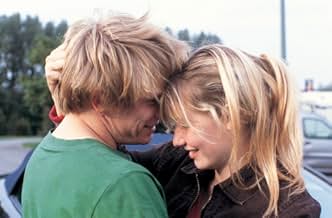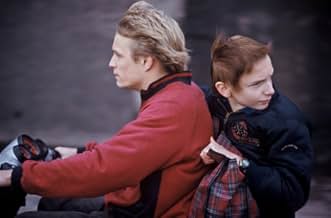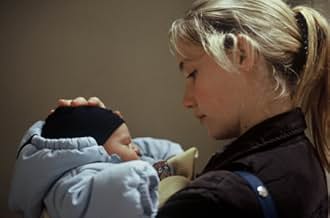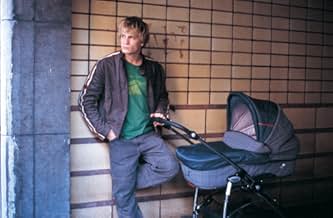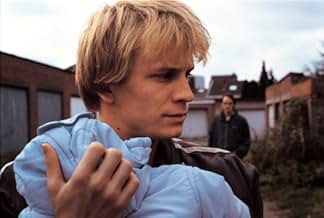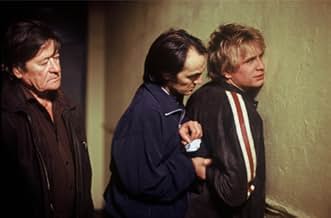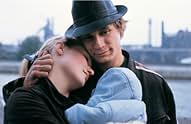ÉVALUATION IMDb
7,4/10
20 k
MA NOTE
Bruno et Sonia, un jeune couple vivant de ses allocations et des vols commis par la bande de Bruno, ont une nouvelle source d'argent : leur fils nouveau-né.Bruno et Sonia, un jeune couple vivant de ses allocations et des vols commis par la bande de Bruno, ont une nouvelle source d'argent : leur fils nouveau-né.Bruno et Sonia, un jeune couple vivant de ses allocations et des vols commis par la bande de Bruno, ont une nouvelle source d'argent : leur fils nouveau-né.
- Directors
- Writers
- Stars
- Prix
- 14 victoires et 21 nominations au total
Anne Gerard
- Commerçante
- (as Anne Gérard)
Leon Michaux
- Policier Commissariat
- (as Léon Michaux)
Avis en vedette
Dramatic, realistic, proposing honest portrait of an age, generation, near reality. A film about parenthood. Bitter, cold, well made. And about the build of responsability. All - gived in wise manner. With admirable force. A father. His son. A decision. And the transformation. And the price of option.
I had the fortune to go see this at its Belgian premiere, which was attended by the main, and stunningly beautiful female actress, Déborah François. I found myself to be interested in the story from the start. The beginning of the film starts very simply, a young mother with a new-born baby searching on the street for what the audience presumes at the time, and is later verified to be the father of her child. The storyline then develops more as a sketch of the day-to-day living at the bottom of Belgian society. Though despite the fact a grim picture of the central couple's living situation is presented, the film-maker has not crossed the line and has interlaced many light-hearted moments into the movie.
The story develops as Bruno, the baby's father, is quickly shown to have no real interest in the baby or fatherhood, just in making money. He also is portrayed to have a genuine love for Sonya. In this sense the audience follows Brunos life, knowing not whether to cheer him or pray for his downfall, after he makes several questionable choices about the fate of his baby.
I recommend this film to anyone who enjoys a simple film without Hollywood special effects, planned cinematography or any sort of soundtrack. I can see its appeal, but personally I came away wondering what exactly the director was trying to prove by making this film. He did succeed,however, to provide a somewhat entertaining, if slightly heavy film. The cast are excellent.
The story develops as Bruno, the baby's father, is quickly shown to have no real interest in the baby or fatherhood, just in making money. He also is portrayed to have a genuine love for Sonya. In this sense the audience follows Brunos life, knowing not whether to cheer him or pray for his downfall, after he makes several questionable choices about the fate of his baby.
I recommend this film to anyone who enjoys a simple film without Hollywood special effects, planned cinematography or any sort of soundtrack. I can see its appeal, but personally I came away wondering what exactly the director was trying to prove by making this film. He did succeed,however, to provide a somewhat entertaining, if slightly heavy film. The cast are excellent.
Bruno (Jérémie Renier, magnificent) and Sonia (Déborah François, who reminds me of a younger Julie Delpy) are immature, teen lovers. They live on the streets of Seraing, Belgium, getting money from Bruno's gang's petty crimes. Sonia gives birth to a baby boy, Jimmy, but Bruno is totally indifferent. He sells his newborn son without Sonia's consent, and she has a nervous breakdown when he tells her what he did. Bruno then goes against all odds to get Jimmy back, but it won't be an easy ride.
"L'Enfant" is a beautiful, raw poetry about children who haven't grown up, and have their own kids without even knowing how to care of themselves. This is a film of silences, gestures that say more than a thousand words. "L'Enfant" is the first film by Luc and Jean-Pierre Dardenne that I've had the opportunity to watch, and I couldn't be more satisfied. After reading great things about some of his other films - "La Promesse" (1996), "Rosetta" (Golden Palm at Cannes 1999), "Le Fils" (2002, Olivier Gourmet was awarded Best Actor at Cannes) -; now I understand why they're considered some of the most talented names making films nowadays. Their honesty and strength to tell this poignant story, which could easily become an absurd melodrama, is mindblowing. "L'Enfant" gave the Dardenne brothers a second Golden Palm at Cannes, and hopefully the pompous award will make more people curious to check this work of art. Nothing is as simple as it seems, and as we get into the nightmarish world of Bruno, we see he's not only an immature, cruel lad who sold his own kid, but someone who hasn't even begun to live.
Sad and remarkable, "L'Enfant" has some similarities with Hector Babenco's classic "Pixote - A Lei do Mais Fraco" (1981) and is certainly one of the year's best. 10 out of 10.
"L'Enfant" is a beautiful, raw poetry about children who haven't grown up, and have their own kids without even knowing how to care of themselves. This is a film of silences, gestures that say more than a thousand words. "L'Enfant" is the first film by Luc and Jean-Pierre Dardenne that I've had the opportunity to watch, and I couldn't be more satisfied. After reading great things about some of his other films - "La Promesse" (1996), "Rosetta" (Golden Palm at Cannes 1999), "Le Fils" (2002, Olivier Gourmet was awarded Best Actor at Cannes) -; now I understand why they're considered some of the most talented names making films nowadays. Their honesty and strength to tell this poignant story, which could easily become an absurd melodrama, is mindblowing. "L'Enfant" gave the Dardenne brothers a second Golden Palm at Cannes, and hopefully the pompous award will make more people curious to check this work of art. Nothing is as simple as it seems, and as we get into the nightmarish world of Bruno, we see he's not only an immature, cruel lad who sold his own kid, but someone who hasn't even begun to live.
Sad and remarkable, "L'Enfant" has some similarities with Hector Babenco's classic "Pixote - A Lei do Mais Fraco" (1981) and is certainly one of the year's best. 10 out of 10.
Although I have not seen all other Cannes' comp. films, I think this is a worthy winner of the Palm d'or. The film's scenery is gray Seraing, like the previous Dardenne films, and I think this is the first film in which the camera-work complements the scenery and story near perfectly. Scene's often contain only one or two shots, cutting right when everything has been said. Its one of the few films where I did not notice the camera (I'm a student cameraman), which should be the goal of every cameraman, at least in this style of film. The acting is very impressive (especially Jeremie Renier as Bruno), like previous Dardenne Films. The film seems the most accessible Dardenne so far, although it does not bore in simplicity (I saw it twice in one week, avant-premiere and sneak preview, and I liked the second time best).
The Dardennes, who won their second Palme d"Or at Cannes this year with "L'Enfant" (The Child), describe it as "a love story that is also the story of a father." Twenty-year-old Bruno (Jérémie Renier) is a petty thief and scam artist in Seraing, an east Belgian steel town, who lives off his girlfriend's welfare and impulsively spends whatever he steals. When eighteen-year-old Sonia (Déborah François) returns after the birth of their son Jimmy, Bruno's far worse than merely unready to accept the responsibility of fatherhood. Unbeknownst to Sonia, he decides to sell the baby on the black market. The film is about what happens following this grotesquely ill-advised decision. Who is really the "child" here? Well, clearly the story is about Bruno.
"L'Enfant" is urgent with movement and has little talk. As with the 1996 "La promesse" (The Promise, 1996), where Jérémie Renier debuted, "Rosetta" (1999), and "Le Fils" (The Son, 2003), the action is ceaseless and obsessive and seems almost real-time. But the Dardennes make every minute count. In those rare moments when the hyper-kinetic Bruno is momentarily still and the camera looks into his face, there's a strong sense of the doubt that will lead to his transformation. When Bruno tells Sonia "I'm sorry," or "I need you" and "I love you" the words carry weight because he doesn't normally ever say such things. But Sonia says, "You lie as you breathe." "L'Enfant" is as powerful and accomplished as anything the Dardennes have done, and as thought-provoking.
"L'Enfant" is urgent with movement and has little talk. As with the 1996 "La promesse" (The Promise, 1996), where Jérémie Renier debuted, "Rosetta" (1999), and "Le Fils" (The Son, 2003), the action is ceaseless and obsessive and seems almost real-time. But the Dardennes make every minute count. In those rare moments when the hyper-kinetic Bruno is momentarily still and the camera looks into his face, there's a strong sense of the doubt that will lead to his transformation. When Bruno tells Sonia "I'm sorry," or "I need you" and "I love you" the words carry weight because he doesn't normally ever say such things. But Sonia says, "You lie as you breathe." "L'Enfant" is as powerful and accomplished as anything the Dardennes have done, and as thought-provoking.
Le saviez-vous
- AnecdotesJimmy is played by 40 different babies.
- ConnexionsFeatured in Smagsdommerne: Episode #3.17 (2006)
Meilleurs choix
Connectez-vous pour évaluer et surveiller les recommandations personnalisées
- How long is The Child?Propulsé par Alexa
Détails
- Date de sortie
- Pays d’origine
- Sites officiels
- Langue
- Aussi connu sous le nom de
- The Child
- Lieux de tournage
- Rue de la Banque, Seraing, Liège, Wallonia, Belgique(Sonia's apartment exteriors)
- sociétés de production
- Consultez plus de crédits d'entreprise sur IMDbPro
Box-office
- Budget
- 3 600 000 € (estimation)
- Brut – États-Unis et Canada
- 651 941 $ US
- Fin de semaine d'ouverture – États-Unis et Canada
- 44 537 $ US
- 26 mars 2006
- Brut – à l'échelle mondiale
- 5 507 396 $ US
- Durée1 heure 35 minutes
- Couleur
- Mixage
- Rapport de forme
- 1.66 : 1
Contribuer à cette page
Suggérer une modification ou ajouter du contenu manquant



